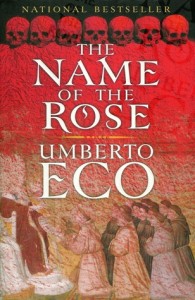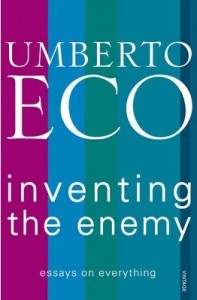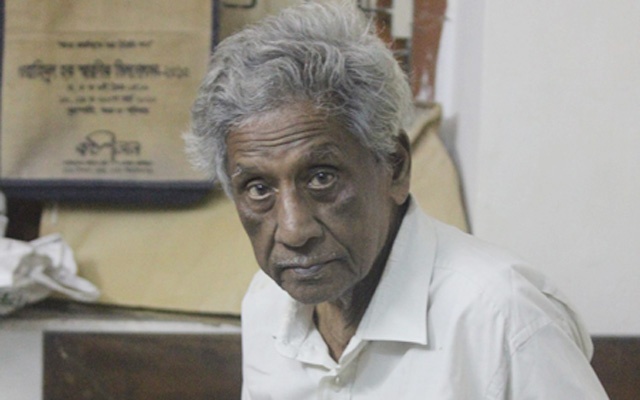The news of Umberto Eco’s (5 January 1932 – 19 February 2016) death is not only very saddening but has created a problem concerning his identity. Of course, the identity of a writer is often established through his work. But Eco’s work is so vast and full of variety that the question arises what is he actually not? Eco as a writer walked through almost everything, therefore, finding his actual identity has become a difficult problem for many. This only happens in the case of a very few writers across the world. Some people say that Eco’s achievements are timeless — everyone agrees with this; however, people still fails to properly understand these achievements. That is why I am going to briefly discuss some of the issues regarding his work. The intention here to be inspired reading Eco and at the same time, understanding his work.
Although Eco is a well-known fiction writer, he claims, ‘I am a philosopher; I only write novels on weekends.’ Eco was once asked in an interview, ‘Your famous novel The Name of The Rose has fully been read by only a few readers. But despite that it has become so famous — what do you think about that?’ Eco’s simple answer was, ‘It is most likely that it will not be read fully. Reading an entire novel filled with Latin quotations is not very comfortable. And not everyone usually reads a book completely anyway.’ Even in South Asia along with other places we have heard discussions about Eco, especially this novel. But we have not observed much critical reading of Eco. The most important area of Eco’s work is semiotics but still that is missing from most of the discussions on him. I will return to this topic later. Before that let me say a few words about the problem of discovering Eco’s identity.
‘The name of the Eco’:
MASTURAH Alatas, author of The Life in The Writing, in 24 february, 2016 he wrote a piece with the following title (‘The name of the Eco’, NewAge.net, 24 February). Eco is a philosopher, historian and public intellectual — who is also a professor. He wrote children’s book. It is difficult to find any topic on which he did not write essays and articles. He also used to regularly write columns. And none of these works were superficial. Whatever he wrote was a journey of knowledgeable invention. To give such a writer just one identity is to dishonor him, thinks Masturah Alatas. Right after his death on February 19, 2016,Milan,Italy, different media outlets started to identify him as a professor, writer, intellectual, semiotician, so on and so forth. Thus, Alatas suggested that it would be best to address Eco simply as a writer. A writer who is both prolific and versatile, because the news of his death, starting from global news-outlets to adults and even in many youths, created such an environment of mourning. Even apart from the serious readers, amongst the occasional readers also, it can be seen from their Facebook and Tweeter accounts that the news of Eco’s death has instigated a massive response. This is very rare, at least in recent times. Overall, I believe that Alatas is right, instead of giving fragmented identities to Eco, if we say that he was a ‘writer’ then we can say a lot about him. Now, to understand the importance of his writing, we will return to what he wrote about.

Because Eco wrote about so many things, it is not possible to describe such massive subjects in only one essay. In this essay I will briefly discuss the two topics which had created the most controversy and are often less discussed. And I will finish this essay with an indication as to why it is important for the people of the non-western and so called third world to read Eco’s body of work.
Semiotics and hermeneutics:
There was some news coverage regarding semiotics in the global media after Eco’s death. Needless to say, there will also be many essays published on Eco. But we need to be careful of the idea of semiotics itself. Semiotics is usually translated into the study of signs but in reality, it’s not. Semiotics is the study of the production of meaning, the study of sign processes and meaningful communication. The study of signs is only one portion of it. The term derives from the Greek σημειωτικός sēmeiōtikos, ‘observant of signs’. So we can’t completely define it as the study of signs (not to be confused with the Saussurean tradition called semiology which is a part of semiotics). And it is not limited to the study of linguistics. John Locke, in his book An Essay Concerning Human Understanding, had used the term in book 4 chapter 21. Many thinkers have worked on this subject matter. The importance of Eco’s work in this filed is so great that one can write an entire book to describe it. To speak of it briefly, Eco in his famous book, A Theory of Semiotics and The Name of the Rose dealt with the topic in such a way, it had never been done before. He basically illustrated the practical use of semiotics through his novels. He also made important contributions in the field of hermeneutics which we, in Islamic world, know as Tafsir (which is frequently used to interpret religious texts). Eco has also critiqued iconicism and iconic signs. The reason Eco’s work on this subject is considered to be iconic is that he began the work of interpretative semiotics. This created a new branch of study on the subject. He made use of semiotics in his novels in such a way that it not only surprised the fiction readers, but also, many of the thinkers. How signs create meaning and how the meaning changes and its practical uses he introduces through this popular medium. So reading his work with a little bit of attention will tell you why he called himself a part-time novelist. In his novels, he does not only focus on the story itself — overall, he deals with ideas. There is no doubt that for people who deal with the history of language and other fields of thought, this is quite astonishing.
‘What do poets reveal to us? It is not that they say Being, they are simply trying to emulate it.
Since the name of Jacques Derrida is quite well known in the West and the South Asia, we have heard of the study of signs before. But we have not yet discussed about hermeneutics much here. The subject is relatively new. Eco’s books on this subject are, La struttura assente (1968; literally: The Absent Structure), A Theory of Semiotics (1975), The Role of the Reader (1979), Semiotics and Philosophy of Language (1984), The Limits of Interpretation (1990), Kant and the Platypus (1997), and From the Tree to the Labyrinth: Historical Studies on the Sign and Interpretation (2014). So how does Eco deal with the subject of semiotics? He began the first chapter of his book, Kant and the Platypus with the name ‘On Being’. He begins the second chapter with the heading ‘Semiotics and the something’. Martin Heidegger is most well-known for the discussion about the relation between the concept of being and the concept of semiotics. Still Eco has added some work here which is considered to be extremely important. He argues as to why semiotics and something should be discussed together. The various languages are considered as systems that are already constituted the moment users express themselves, state, indicate, ask or command. He thought that a major problem regarding the entire study of semiotics is that it still does not show to what exactly are we referring to when we speak. What is that something, which is already present before our linguistic construction, which allows us to speak? Which platform of being does the act of speaking arise from? He believed that the reason why we talk is more psychological and not linguistic and it relates to being. A part of which, remains outside of the structure. Eco has worked a lot on this metaphysical area. From a linguistic perspective the being of something is almost never seen. That the existence of being (something) comes before language is inquired about. Through this problem he concentrates on hermeneutics studies. He wrote, The Limits of Interpretation (1990). In light of this, let me mention that Heidegger has also done some important work in this regard. Heidegger’s concept about the act of interpretation is that the act of narrating something is related to our existence. It is not only methodical and systematic. It is an act which does not completely depend on our willing and unwillingness alone. But Eco does see one limitation to this infinite interpretative arena. Eco begins a new inquiry into its truthfulness with language and our existence. His focus is different from the work of Heidegger and can be seen clearly through his compilation of essays in The questioning of the poets. Whereas Heidegger has highlighted the importance of the relationship between being and poets, to priorities poets, Eco says: ‘What do poets reveal to us? It is not that they say Being, they are simply trying to emulate it. (Kant and the Platypus, p-32)
He thought that poets could not present to us the concept of being as it is. They simply imitate being. And he thought that through the description of being poets often cannot say much about being as it is — in fact, being is more self-apparent. Here he expresses an opinion which is different than that of Heidegger (it may seem just the opposite). In the field of semiotics, there is enormous space for systematic discussion of such important subjects. Interested readers might find some of the references to start with in this article as it’s not possible here to discuss these things in details. Description, meaning, being, language — one cannot discuss such complex matters briefly, so simply, this is what Eco has demonstrated to the world.
I did not intend on discussing any of these complexities here. Still I mentioned a bit of it so that we do not consider Eco to be only a popular fiction writer. And although I am still a student in this field of study, learning new things every day. And I know that some readers may find all of this to be quite monotonous. But still, hermeneutics is a very important subject for us. I remember that the book Clash of Civilizations, when it first appeared, created a storm in the market. At that time, Edward Said did a very appropriate critique of it. He argues that there is actually no clash of civilization, only a clash of interpretation. How this interpretation is made from different perspectives is discussed in hermeneutics. To know and understand an incident or text, attempts to describe or narrate it, to create new descriptions — is nothing new to the world. But to make it methodical, in the West, is a relatively new phenomenon. In 1960, the book Truth and Method of George Gadamer was published. In this book, he explained, in
details, the history of hermeneutics, topics of discussion and their importance. The subject has, since then, received great importance. Eco started to write seriously on these topics since 1967. Although it did take some time for him to receive attention for his work on this subject. In the Arab world, however, it was given importance from even before the medieval period, especially for the purpose of interpreting divine texts. Therefore, knowledge is not always imported from the West. But because today we always have our sight set on Europe and America, most people get the impression that knowledge is given birth in the west while people from the rest of the world sit idly by laying eggs! Hermeneutics works with description, interpretation and narration. The reason for so much discussion about this subject is that through interpretation and narration power is created. It is strongly related to history and politics. And we, the people of South Asia have now become the victims of narration/interpretation. So, in order to honour Eco, I have haphazardly spent a few words to describe this subject so that our youth are encouraged to study it. Hermeneutics is also known as act of interpretation in the western world. Thus, it is very important for us to know about it as well.
Reading Eco in South Asia:
Some writers themselves become a phenomenon sometimes. In the age of market economy, popularity of pornographic stars and writers — can easily be seen to be heavily glamorized by the media. Eco is different because the way he became famous in popular media is completely unrelated to his work. The biggest misrepresentation is when the media popularizes him as a popular detective story writer. He does make use of suspense and history as well as others, but the way he spreads philosophical ideas through his novels, and brings to the field philosophical problems through them, is rarely mentioned.
 One of the main problems of writing about Eco is that sometimes, your personal opinions also come out, especially now that he is gone. When we write about someone in a hurry, you are bound to express a few personal emotions. I also thought of doing the same thing. But I lost interest in doing so after reading a piece written by Hamid Dabashi, professor of Columbia University. The piece is titled — Umberto Eco is dead: Long live Umberto Eco (Al-Jazeera, February 21). In his writing he expressed his personal relations with Eco and his sadness at his passing away. A reader commented there, ‘What kind of writing is this? It is a writer’s own narcissistic narration.’ I became alarmed after reading this and therefore consciously trying to escape from my personal emotions about Eco. When he was asked to say a few words for newly turned writers, in an interview, he said ‘You should not take yourself too seriously. Instead of taking on the pressure to write and publish books try to take and discover pleasure in your work.’ I really appreciated this comment of his. Once he got engaged with Orhan Pamuk in a discussion at Istanbul. The discussion turned into a very interesting conversation on reading fictional books. I am mentioning this because in our part of the world there are writers who believe that their writing is a success if only, they can make the reader cry. Eco dismisses the idea stating that people who cry from reading novels are stupid of a higher level. And when a writer writes fiction, it is impossible to remind the reader over and over again that what they are reading is not reality. And if you can do that then the reader won’t cry. Because they will understand that this is only fiction. So, the writer must remain honest. In any case, Eco is a very important thinker of our time. That he has travelled from pornography to Plato, life to literature, we should slowly try to enter into in his body of writings.
One of the main problems of writing about Eco is that sometimes, your personal opinions also come out, especially now that he is gone. When we write about someone in a hurry, you are bound to express a few personal emotions. I also thought of doing the same thing. But I lost interest in doing so after reading a piece written by Hamid Dabashi, professor of Columbia University. The piece is titled — Umberto Eco is dead: Long live Umberto Eco (Al-Jazeera, February 21). In his writing he expressed his personal relations with Eco and his sadness at his passing away. A reader commented there, ‘What kind of writing is this? It is a writer’s own narcissistic narration.’ I became alarmed after reading this and therefore consciously trying to escape from my personal emotions about Eco. When he was asked to say a few words for newly turned writers, in an interview, he said ‘You should not take yourself too seriously. Instead of taking on the pressure to write and publish books try to take and discover pleasure in your work.’ I really appreciated this comment of his. Once he got engaged with Orhan Pamuk in a discussion at Istanbul. The discussion turned into a very interesting conversation on reading fictional books. I am mentioning this because in our part of the world there are writers who believe that their writing is a success if only, they can make the reader cry. Eco dismisses the idea stating that people who cry from reading novels are stupid of a higher level. And when a writer writes fiction, it is impossible to remind the reader over and over again that what they are reading is not reality. And if you can do that then the reader won’t cry. Because they will understand that this is only fiction. So, the writer must remain honest. In any case, Eco is a very important thinker of our time. That he has travelled from pornography to Plato, life to literature, we should slowly try to enter into in his body of writings.
There is no one special reason of why Eco is important for our time. Of course, his sense of humour is one of them. But there is another side to the story; Eco’s writings travel through time so fast that one would be surprised. He goes from ancient to medieval to modern time in one sentence. He deals with things that are so small yet relevant to so many subjects that there is no way not to be thunderstruck. He adds sophisticated philosophical issues to small daily life events in such a way, that it makes you think that thinking is a very easy thing to do in your every day life. It is not an intellectual or cultural duty which he is performing. It is completely of his own calling. And it is very normal. Reading his work makes you realize that there is much analysis to be done even in such simple topics, yet we are busy leading a hedonistic life. Eco writes in a very humorous fashion. But when one finally finds the struggle of thinking it might be pleasantly surprised. Why do we want to live and die thinking so little? Such questions may well arise from reading his works. Another interesting aspect of his work is that he usually dealt with subjects and writers that are so scarcely popular and discussed that there are no equivalent examples of it. His philosophical writings also move forward just as smoothly. It is important to become master of such craftsmanship. Then we may be able to overcome our own writing prejudices what many of us today suffer.
In my country today there are those who are saying that the myth of Resistance was a Communist lie. It is true that the Communists exploited the Resistance as if it were their personal property.’ In resistance there is a leftist lie. And it is true that the leftists often see resistance as their own property
The thrill of thinking critically and of reading — both are present in Eco’s writings. This of course, is probably known to all. Outside of this, there are other important reasons for us in South Asia to read his work. Writers who have evolved in colonial modernity, in most cases, because of the Western influence, can only write stories based on a linear historical timeframe, yet struggle immensely when they have to think critically. They believe that literature is a way for self-establishment and promotion. Usually what happens because of this is that they end up serving the ‘mainstream’ or the ‘establishment’, transforming literature into a form of circus. The longer they get to stay in the mainstream the longer they are heard of or from. Once they leave the mainstream, we barely ever hear from them. Without the backing of the establishment and the mainstream they struggle to stand on their own feet, leading them to depend on political achievements and glorifications. That literature is not a trivial subject mainly based on emotion and that a novel writer can also come up with views that can shake the whole world we cannot fathom. But Eco is definitely one of those rare individuals.
Thus, his death is honestly very saddening. There are not too many such thinkers left in this present world. In Travels in Hyper Reality Eco deals with important philosophical questions. Inventing the Enemy is the one where a philosopher speaks casual matters from different perspectives as it’s a compilation of his lectures. He speaks of such complex matters in such a crafty way. He states on that ‘The state is always trying to discover an enemy’. Who understands this better than us (people from South Asia)? Our states often survive on this. He further adds ‘To cling onto power, whoever can paint their enemy the ugliest, can become the most fascist’. People of the South Asia knows this very well.
This book can come in very handy in understanding and describing the current conditions of our part of the world. He poses a question ‘How can a state exist without an enemy?’ It is a question which is very relevant to the entire world. We live in a time of statehood and crises brought about by the problems of statehood. Regardless, Eco has influenced the global environment of thinking quite substantially and continues to do so. It is truly mesmerizing how many topics and subjects he has worked with. He died at the age of 84. He is no longer with us, but his work remains with us to be read. We know that there is no death for real thinkers. It is just that we will not receive any new writings from him. But through reading and re-reading his work, he will surely re-emerge in the form of new ideas. I express my deep love for a great thinker and express my sadness at his death.
 Another very important affect which his work has had is to encourage the process of thinking and imagining. We may always think in that process without having the courage to express it, which he did. A very famous work of his is Ur Fascism. It is a very short yet such an important work that it is impossible to understand it without engaging with it. What he knows about fascism almost instantaneously changes when we read this work of his. Eco identifies cult of tradition as the first characteristic of our fascism and states that traditionalism is older than fascism. This is so much true if we observe the events happening around us and the uprising of authoritarian politics across the globe. Eco continues, ‘In my country today there are those who are saying that the myth of Resistance was a Communist lie. It is true that the Communists exploited the Resistance as if it were their personal property.’ In resistance there is a leftist lie. And it is true that the leftists often see resistance as their own property. People who keep tabs on the leftists of South Asia, especially, in Bangladesh know how true it is. And how they turn into fascists because of their lack of understanding about the resistance itself. Eco has worked with so many subjects that to truly understand his influence reading one of his works is not enough. It is like a huge mountain which cannot be wholly seen from one side alone. One has to go around looking at it from different sides. His work will surely force people to think for a long time to come. And there will also come many critics to critique these new thoughts. My respect of him as a writer grew much more as he wrote about India and Pakistan as well. He has written a book on Malaysia. To write about such a distant land after being born in a place like Europe was probably only possible because of his ability to write novels. But as a thinker, Eco could not escape from the European thought process (subjectivity). Although he did write about the Arab world, he couldn’t escape his thought process from the Western Greek-Roman paradigm. But this doesn’t reduce the importance of his thought. This is probably a problem with European in general. But when we read his work, we must remain careful not to idolize him too much. We believe that thoughts are not limited to the boundary of time-space. From that perspective, we must read his work from our contextual reality. We must be critical to sharpen our own views.
Another very important affect which his work has had is to encourage the process of thinking and imagining. We may always think in that process without having the courage to express it, which he did. A very famous work of his is Ur Fascism. It is a very short yet such an important work that it is impossible to understand it without engaging with it. What he knows about fascism almost instantaneously changes when we read this work of his. Eco identifies cult of tradition as the first characteristic of our fascism and states that traditionalism is older than fascism. This is so much true if we observe the events happening around us and the uprising of authoritarian politics across the globe. Eco continues, ‘In my country today there are those who are saying that the myth of Resistance was a Communist lie. It is true that the Communists exploited the Resistance as if it were their personal property.’ In resistance there is a leftist lie. And it is true that the leftists often see resistance as their own property. People who keep tabs on the leftists of South Asia, especially, in Bangladesh know how true it is. And how they turn into fascists because of their lack of understanding about the resistance itself. Eco has worked with so many subjects that to truly understand his influence reading one of his works is not enough. It is like a huge mountain which cannot be wholly seen from one side alone. One has to go around looking at it from different sides. His work will surely force people to think for a long time to come. And there will also come many critics to critique these new thoughts. My respect of him as a writer grew much more as he wrote about India and Pakistan as well. He has written a book on Malaysia. To write about such a distant land after being born in a place like Europe was probably only possible because of his ability to write novels. But as a thinker, Eco could not escape from the European thought process (subjectivity). Although he did write about the Arab world, he couldn’t escape his thought process from the Western Greek-Roman paradigm. But this doesn’t reduce the importance of his thought. This is probably a problem with European in general. But when we read his work, we must remain careful not to idolize him too much. We believe that thoughts are not limited to the boundary of time-space. From that perspective, we must read his work from our contextual reality. We must be critical to sharpen our own views.
Eco has an amazing way of viewing death. It reminded me of how often we look at the sky without even realizing why we look at it. Eco wrote, ‘How does a person feel when looking at the sky? He thinks that he does not have enough tongues to describe what he sees. Nevertheless, people have stopped describing the sky, simply listing what they see… We have a limit, a very discouraging, humiliating limit: death. That is why we like all the things that we assume have no limits and, therefore, no end. It is a way of escaping thoughts about death. We like lists because we do not want to die.’
We sometimes look at the sky and become speechless. We only get a strange feeling from it. We cannot even describe that feeling. When someone who we are very fond of dies, we look at the sky in their search. And we try to describe the sky (as I have tried to describe Eco here). But what we really look for is our own limitation, that is, death. But when we see something which has no limit, we use it to try to escape that limitation, to escape from death. We try to approach the infinite. We are fans of the infinite because we do not want to die. So we look at the sky. Now we look at Eco, ‘Eco, it is time for you to become the sky’.
সম্মৃদ্ধ জাতি গঠনের জন্য চাই উন্নত চিন্তা। গনতান্ত্রিক দেশ ও সমৃদ্ধ জাতি গঠনে শুধু তথ্যযুদ্ধ এবং ইস্যু দিয়ে ইস্যু চাপা দেয়া নয়, দরকার মননশীল সাংবাদিকতা। একতরফা ভাবনা বা মতের প্রতিফলনের বাইরে সত্য ও প্রজ্ঞার সন্নিবেশ ঘটাতে বিশ্লেষণী সাংবাদিকতার কোন বিকল্প নেই। কিন্তু এই উদ্যোগ আপনাদের সক্রিয় অংশগ্রহণ ছাড়া সম্ভব নয়। ডোনেট করুন এবং বুদ্ধিবৃত্তিক জাতিগঠনের গণতান্ত্রিক সংগ্রামে অংশীদার হোন।
মোবাইল ব্যাংকিংঃ Bkash & Nagad (personal): 01677014094
https://paypal.me/jobanmedia










